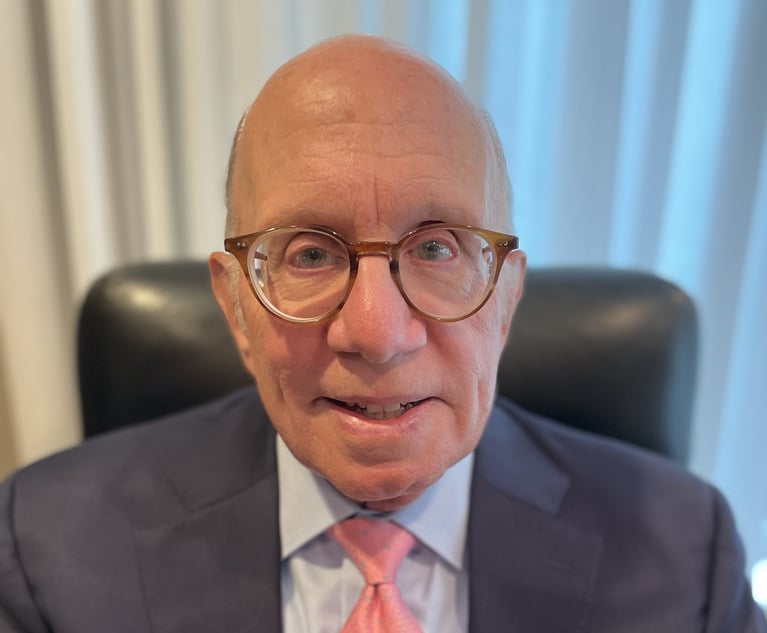 Photo: Kira_Yan/Shutterstock.com
Photo: Kira_Yan/Shutterstock.comHow Will Those Who Follow Judge Us?
We today, in what we now face, won't be able to hide behind anonymity—how we, our public figures and our communities conducted ourselves is blasted all over all types of media and therefore, one easily presumes, preserved for generations to come and perhaps forever. History will judge us! And we will judge us!
March 26, 2020 at 11:00 AM
7 minute read
In the final analysis, the questions of why bad things happen to good people transmutes itself into some very different questions, no longer asking why something happened, but asking how we will respond, what we intend to do now that it happened.
—Pierre Teilhard de Chardin
Some turn to the Scripture in times of personal peril, turmoil or strife. Maybe they look to Job, a figure in all three major western religions. Perhaps Job's ultimate survival despite the enormity of his calamity will help them through their own. Still, some actually judge Job for questioning God, even though he was clearly pushed to his breaking point. How, they ask, could he in any way challenge God's ways? As if he had not already lost his wife, his sons, his flocks, his fortune—all for no apparent reason other than a test manipulated by Satan, with the concurrence of God? A faithless wretch, some might argue. Judges—particularly those who sit millennia away and without enduring suffering in the same way—can often be harsh in their judgments.
Sometimes, when we imagine how we collectively might react to a societal calamity, modern man looks to how the Hebrews conducted themselves through slavery in Egypt and through the aftermath of the Exodus to better determine how "we" might match up if our world, as we know it, were to fall apart.
Just imagine a nationwide (maybe even worldwide) slavery, followed by an exodus—unyielding starvation and thirst; enemies to the rear and along the way. And murmurs always about the ostensibly weak and challenged leader. One typically only envisions these former slaves as whiners and complainers when dealing with a leader appointed by God Himself.
Can we, however, judge those former slaves any differently? Do we find them helping their neighbors? Do we see them sharing their precious food or water? Do they sacrifice their goods for the aged or infirm among them? Do they risk their own health for the sick? Do they offer their leader aid and support in hard times? We simply don't know.
In truth, the Bible is an account exclusively reliant on faith. It is not a history—indeed, there is no historicity to it at all. The Bible tells what it tells, but it describes nothing about the daily lives or actions of individuals, even leaders, except in the instance of critical episodes. There are no headaches, no pulmonary disorders, no bothersome jealousies, no acts of community or goodness except, sometimes, on the part of leading figures.
And in the instance of plagues or group catastrophes, we learn nothing about how the people—the Egyptians who suffered plagues before the exodus, or the onslaught against the Hebrews when they worshipped the Golden Calf at the foot of Sinai or plague when they consorted later with Midianite women in the desert—acted among themselves and toward each other. There were no historians, or at least none whose work survived. Nor any of the other outlets—William Shirer, CNN, Fox, The New York Times. There was, of course, no social media; and no ethicists telling us what behavior is acceptable. At least none that we can rely on today.
More critically, though, we have no online commentators, op-ed writers or bloggers whose contemporary and anecdotal posts were preserved in detail and perpetuity for us to better know how people behaved toward one another. There is nothing, really, to describe for us how ancient mankind—our ancestors—conducted itself in times of catastrophe.
We today, in what we now face, won't be able to hide behind anonymity—how we, our public figures and our communities conducted ourselves is blasted all over all types of media and therefore, one easily presumes, preserved for generations to come and perhaps forever. History will judge us! And we will judge us! Thus, if our contemporaries hide from their neighbors that they have "been exposed" so that they infect others, we will know. They will be pariahs, and there will be no escape later for what they did. If they gouge the needy when selling essential pharmaceuticals, today's blogs about them will be the record of today, and the first draft of history. Those demonized today will be known for all time for what they have done.
If chosen (or even unchosen) leaders deny to us the extent of our vulnerability or intentionally understate the danger for misguided—maybe political—reasons, their iniquities will be there eternally for all to see. We have long ago given up the safe harbor of obscurity. Put aside, however, our leaders. If one's personal "enemy" armed with an iPhone sees her jump a pharmacy line of elderly shoppers to purchase the last essential item on the shelf, her contemporaries will see what she did, but so will her great, great grandchildren should they decide to surf the Internet.
Still, it is not about the fact that we can no longer hide our personal misconduct or societal transgressions from our neighbors, or from our progeny. It more concerns how today's society will be viewed by those who follow—for they will come to know better than ever before the reality of "who" we were when the chips were down. Mary Mallon, better known as "Typhoid Mary," is believed to have infected 51 people, three of whom died. She was an asymptomatic carrier of typhoid fever who refused to cooperate with the authorities and, astonishingly, continued her work as a cook with all the potential danger that that presented. Are there not those among us who recklessly pose risk to others in just the same way, knowing that they currently suffer symptoms or await test results, public figures included? Not to mention how we go about metaphorically pointing fingers at those who, during this period of group paranoia, we come to believe exposed us, even if it turns out that we never were endangered at all.
The morality that we impose on ourselves today is the morality that those who follow us will see. We must not be lackluster in how we conduct ourselves. The absence of transparency, for lack of a better word, that existed yesteryear has been replaced by the unobstructed sunlight that exists today. And while we typically judge the conduct of those who traversed the desert en route from Egypt in extremely harsh terms, just imagine the judgment of those who look back on our conduct if we fail miserably when we could have done so much better.
Think about it. How will they judge us? We only have to consider how we should judge ourselves!
Joel Cohen practices white-collar criminal defense law as senior counsel at Stroock & Stroock & Lavan. He is an adjunct professor at Fordham and Cardozo Law Schools and is the author of several books, including 'Moses: A Memoir' (Paulist Press, 2003). Dale J. Degenshein, a real estate partner at Armstrong Teasdale, is also an adjunct professor at Cardozo and writes regularly. This article is the authors' and does not reflect the views of their firms or their clients.
This content has been archived. It is available through our partners, LexisNexis® and Bloomberg Law.
To view this content, please continue to their sites.
Not a Lexis Subscriber?
Subscribe Now
Not a Bloomberg Law Subscriber?
Subscribe Now
NOT FOR REPRINT
© 2024 ALM Global, LLC, All Rights Reserved. Request academic re-use from www.copyright.com. All other uses, submit a request to [email protected]. For more information visit Asset & Logo Licensing.
You Might Like
View All
Why Is It Becoming More Difficult for Businesses to Mandate Arbitration of Employment Disputes?
6 minute read
Law Firms Mentioned
Trending Stories
- 1Gibson Dunn Sued By Crypto Client After Lateral Hire Causes Conflict of Interest
- 2Trump's Solicitor General Expected to 'Flip' Prelogar's Positions at Supreme Court
- 3Pharmacy Lawyers See Promise in NY Regulator's Curbs on PBM Industry
- 4Outgoing USPTO Director Kathi Vidal: ‘We All Want the Country to Be in a Better Place’
- 5Supreme Court Will Review Constitutionality Of FCC's Universal Service Fund
Who Got The Work
Michael G. Bongiorno, Andrew Scott Dulberg and Elizabeth E. Driscoll from Wilmer Cutler Pickering Hale and Dorr have stepped in to represent Symbotic Inc., an A.I.-enabled technology platform that focuses on increasing supply chain efficiency, and other defendants in a pending shareholder derivative lawsuit. The case, filed Oct. 2 in Massachusetts District Court by the Brown Law Firm on behalf of Stephen Austen, accuses certain officers and directors of misleading investors in regard to Symbotic's potential for margin growth by failing to disclose that the company was not equipped to timely deploy its systems or manage expenses through project delays. The case, assigned to U.S. District Judge Nathaniel M. Gorton, is 1:24-cv-12522, Austen v. Cohen et al.
Who Got The Work
Edmund Polubinski and Marie Killmond of Davis Polk & Wardwell have entered appearances for data platform software development company MongoDB and other defendants in a pending shareholder derivative lawsuit. The action, filed Oct. 7 in New York Southern District Court by the Brown Law Firm, accuses the company's directors and/or officers of falsely expressing confidence in the company’s restructuring of its sales incentive plan and downplaying the severity of decreases in its upfront commitments. The case is 1:24-cv-07594, Roy v. Ittycheria et al.
Who Got The Work
Amy O. Bruchs and Kurt F. Ellison of Michael Best & Friedrich have entered appearances for Epic Systems Corp. in a pending employment discrimination lawsuit. The suit was filed Sept. 7 in Wisconsin Western District Court by Levine Eisberner LLC and Siri & Glimstad on behalf of a project manager who claims that he was wrongfully terminated after applying for a religious exemption to the defendant's COVID-19 vaccine mandate. The case, assigned to U.S. Magistrate Judge Anita Marie Boor, is 3:24-cv-00630, Secker, Nathan v. Epic Systems Corporation.
Who Got The Work
David X. Sullivan, Thomas J. Finn and Gregory A. Hall from McCarter & English have entered appearances for Sunrun Installation Services in a pending civil rights lawsuit. The complaint was filed Sept. 4 in Connecticut District Court by attorney Robert M. Berke on behalf of former employee George Edward Steins, who was arrested and charged with employing an unregistered home improvement salesperson. The complaint alleges that had Sunrun informed the Connecticut Department of Consumer Protection that the plaintiff's employment had ended in 2017 and that he no longer held Sunrun's home improvement contractor license, he would not have been hit with charges, which were dismissed in May 2024. The case, assigned to U.S. District Judge Jeffrey A. Meyer, is 3:24-cv-01423, Steins v. Sunrun, Inc. et al.
Who Got The Work
Greenberg Traurig shareholder Joshua L. Raskin has entered an appearance for boohoo.com UK Ltd. in a pending patent infringement lawsuit. The suit, filed Sept. 3 in Texas Eastern District Court by Rozier Hardt McDonough on behalf of Alto Dynamics, asserts five patents related to an online shopping platform. The case, assigned to U.S. District Judge Rodney Gilstrap, is 2:24-cv-00719, Alto Dynamics, LLC v. boohoo.com UK Limited.
Featured Firms
Law Offices of Gary Martin Hays & Associates, P.C.
(470) 294-1674
Law Offices of Mark E. Salomone
(857) 444-6468
Smith & Hassler
(713) 739-1250








